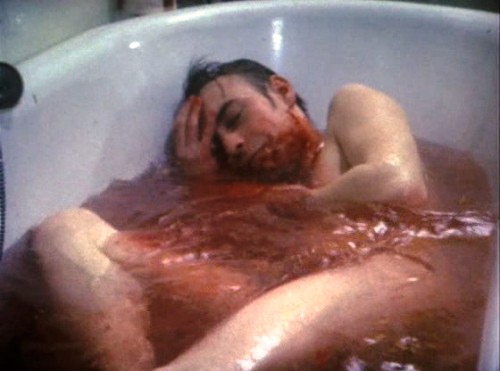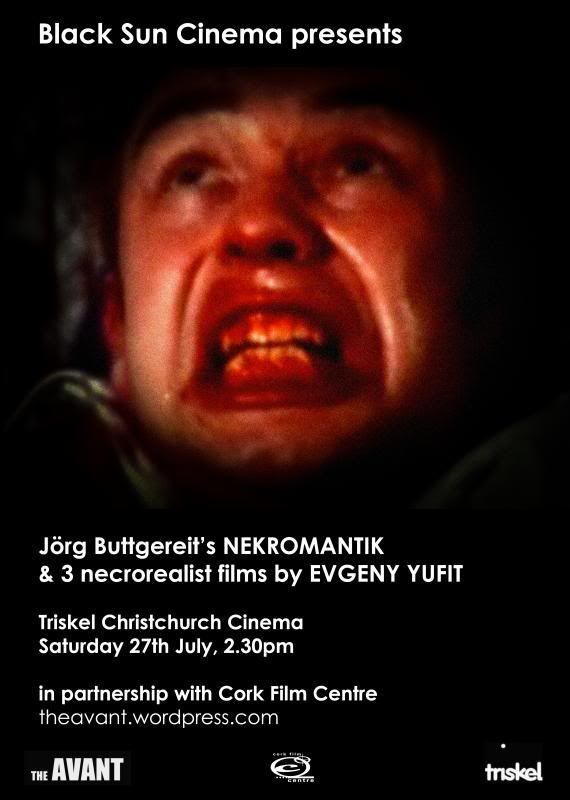Black Sun Cinema presents
Jörg Buttgereit’s NEKROMANTIK
& 3 Necrorealist Films by EVGENY YUFIT
Triskel Christchurch Cinema
Saturday 27th July, 2.30pm
in partnership with Cork Film Centre and the Avant festival
Death is the subject of Black Sun Cinema’s most confrontational programme to date. Death or, more precisely, the subversive energy and perverse eroticism of the abject. Two extreme, taboo-busting visions from ‘80s underground cinema will be exhumed for a very rare big-screen presentation in partnership with Triskel Christchurch Cinema and Cork Film Centre this July 27th. Three raw and utterly berserk short films by Evgeny Yufit, founding figure of the Russian art movement necrorealism, will be paired up with Jörg Buttgereit’s notorious and much-banned feature Nekromantik, cinema’s most iconic meditation on necrophilia.

Werewolf Orderlies (Sanitary-oborotny, Evgeny Yufit, 1984, 5 mins)
Woodcutter (Lesorub, Evgeny Yufit, 1985, 6 mins)
Spring (Vesna, Evgeny Yufit, 1987, 10 mins)
This trio of early films by Evgeny Yufit is a crash course in the energy and aesthetics of necrorealism. This movement began as a despairingly slapstick, punk-like reaction to the hopelessness of life in the final years of Soviet Russia:
“[It] emerged in Leningrad in the early nineteen-eighties. This was the height of the so-called stagnation period, when unliving, undead Soviet Communist Party general secretaries succeeded one another in rapid sequence… The regime’s moribund ideology nourished the new movement, which questioned one of that ideology’s pillars – immortality… A group of young men that included artists, poets, rock musicians, and random acquaintances roamed the streets of Leningrad like a pack of wild dogs. They engaged in mock brawls in abandoned buildings and suburban commuter trains, and they would mercilessly beat a mannequin (a dummy used in forensic investigations) in front of astonished passers-by. Vigilant citizens summoned the police to stop these outrages, but the flagrant idiocy of their behavior saved the participants in these riotous actions from serious consequences on more than one occasion. Yufit was the head of this ‘pack’.” (Oleysya Turkina, Necrorealism)
When Yufit began making films, it was very much in this wild spirit:
“Black-and-white silent cinema was Yufit’s main source of inspiration… These films were shot quickly, often in a single day. The plots arose spontaneously depending on the peculiarities of the landscape, the roster of participants, and suitable surroundings… They contain the energy of spontaneity and the unrestrained fantasizing of their participants on the topic of suicide, which along with their ragged avant-garde editing gained Yufit a reputation as the most uncompromising member of the cinematic underground.” (Turkina).

Nekromantik (Jörg Buttgereit, 1987, 70 mins)
This hallucinatory punk love story between a boy, a girl and a rotting corpse retains its fast won reputation as one of the most shockingly graphic low-budget horror films ever unleashed on the public. What is less often remarked on is that this ‘necro-porn-horror’ is also one of the most oddly lyrical films of its genre and one of the most personal in its experimental approach to narrative. Rather than softening its impact, these qualities succeed in making it something more unsettling than the mindlessly provocative gore-fest its detractors have often dismissed it as.
“Buttgereit’s distinctively alienated musings on the existential isolation of the desiring German subject, his libidinally ambiguous re-animation of the deeply repressed historical past and his highly self-reflexive plays on cinema’s capacity for the dissemination and reproduction of regressive ideologies, position him not only as a horror director par excellence but a major contributor to recent cinematic art in Germany… Buttgereit is a director who engages creatively with that strand of Romantic irrationalism that has lain at the heart of German culture since long before the nation’s first unification in the 1870s— an irrationalism that once manifested itself in Goethe’s rendering of the Faust legend, Hoffman’s tales of the Unheimlich in prose and, much later, in the horror tales of Weimar cinema. Existing somewhere between the nightmare world of the ghost train, the crazy logic of dreams and the representational strategies of avant-garde or experimental cinema, Buttgereit’s films joyfully participate in this irrationality— especially through the frequent inclusion of lengthy or repeated sequences of highly perplexing viscerality.” (Linnie Blake, Kinoeye)
Please note: This film contains images that some viewers may find offensive.

Jörg Buttgereit’s NEKROMANTIK
& 3 Necrorealist Films by EVGENY YUFIT
Triskel Christchurch Cinema
Saturday 27th July, 2.30pm
in partnership with Cork Film Centre and the Avant festival
Death is the subject of Black Sun Cinema’s most confrontational programme to date. Death or, more precisely, the subversive energy and perverse eroticism of the abject. Two extreme, taboo-busting visions from ‘80s underground cinema will be exhumed for a very rare big-screen presentation in partnership with Triskel Christchurch Cinema and Cork Film Centre this July 27th. Three raw and utterly berserk short films by Evgeny Yufit, founding figure of the Russian art movement necrorealism, will be paired up with Jörg Buttgereit’s notorious and much-banned feature Nekromantik, cinema’s most iconic meditation on necrophilia.

Werewolf Orderlies (Sanitary-oborotny, Evgeny Yufit, 1984, 5 mins)
Woodcutter (Lesorub, Evgeny Yufit, 1985, 6 mins)
Spring (Vesna, Evgeny Yufit, 1987, 10 mins)
This trio of early films by Evgeny Yufit is a crash course in the energy and aesthetics of necrorealism. This movement began as a despairingly slapstick, punk-like reaction to the hopelessness of life in the final years of Soviet Russia:
“[It] emerged in Leningrad in the early nineteen-eighties. This was the height of the so-called stagnation period, when unliving, undead Soviet Communist Party general secretaries succeeded one another in rapid sequence… The regime’s moribund ideology nourished the new movement, which questioned one of that ideology’s pillars – immortality… A group of young men that included artists, poets, rock musicians, and random acquaintances roamed the streets of Leningrad like a pack of wild dogs. They engaged in mock brawls in abandoned buildings and suburban commuter trains, and they would mercilessly beat a mannequin (a dummy used in forensic investigations) in front of astonished passers-by. Vigilant citizens summoned the police to stop these outrages, but the flagrant idiocy of their behavior saved the participants in these riotous actions from serious consequences on more than one occasion. Yufit was the head of this ‘pack’.” (Oleysya Turkina, Necrorealism)
When Yufit began making films, it was very much in this wild spirit:
“Black-and-white silent cinema was Yufit’s main source of inspiration… These films were shot quickly, often in a single day. The plots arose spontaneously depending on the peculiarities of the landscape, the roster of participants, and suitable surroundings… They contain the energy of spontaneity and the unrestrained fantasizing of their participants on the topic of suicide, which along with their ragged avant-garde editing gained Yufit a reputation as the most uncompromising member of the cinematic underground.” (Turkina).

Nekromantik (Jörg Buttgereit, 1987, 70 mins)
This hallucinatory punk love story between a boy, a girl and a rotting corpse retains its fast won reputation as one of the most shockingly graphic low-budget horror films ever unleashed on the public. What is less often remarked on is that this ‘necro-porn-horror’ is also one of the most oddly lyrical films of its genre and one of the most personal in its experimental approach to narrative. Rather than softening its impact, these qualities succeed in making it something more unsettling than the mindlessly provocative gore-fest its detractors have often dismissed it as.
“Buttgereit’s distinctively alienated musings on the existential isolation of the desiring German subject, his libidinally ambiguous re-animation of the deeply repressed historical past and his highly self-reflexive plays on cinema’s capacity for the dissemination and reproduction of regressive ideologies, position him not only as a horror director par excellence but a major contributor to recent cinematic art in Germany… Buttgereit is a director who engages creatively with that strand of Romantic irrationalism that has lain at the heart of German culture since long before the nation’s first unification in the 1870s— an irrationalism that once manifested itself in Goethe’s rendering of the Faust legend, Hoffman’s tales of the Unheimlich in prose and, much later, in the horror tales of Weimar cinema. Existing somewhere between the nightmare world of the ghost train, the crazy logic of dreams and the representational strategies of avant-garde or experimental cinema, Buttgereit’s films joyfully participate in this irrationality— especially through the frequent inclusion of lengthy or repeated sequences of highly perplexing viscerality.” (Linnie Blake, Kinoeye)
Please note: This film contains images that some viewers may find offensive.


